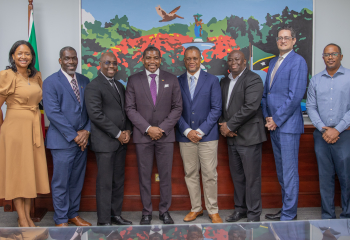Caribbean Development Bank supporting maritime security project of Regional Security System
Collaboration is essential for Caribbean countries in their efforts to strengthen maritime security so as to protect citizens and unlock the potential of the blue economy.
This advice came from Monica La Bennett, Vice-President (Operations) of the Caribbean Development Bank (CDB), last Friday, April 5, 2019 as the Bank signed a USD 335,000 grant agreement with the Regional Security System (RSS) to finance development of a Regional Maritime Security Strategy.
“At CDB, we believe that we should employ more regional approaches to addressing our development challenges…. We see this project as a statement of the Bank’s unwavering commitment to promoting regional cooperation and integration, in keeping with our mandate,” stated La Bennett.
She was speaking at the RSS Council of Ministers meeting in St. Vincent and the Grenadines, where the project was launched.
The Bank’s financing will support the development of national maritime strategies for each of the RSS member countries – Antigua and Barbuda, Barbados, Dominica, Grenada, St. Kitts and Nevis, Saint Lucia and St. Vincent and the Grenadines. The project will also see the creation of an overall Regional Maritime Security Strategy and Implementation Plan which will incorporate the needs of the individual country plans, as well as capacity building and training for the relevant stakeholder agencies.
Chairman of the RSS Council of Ministers, Prime Minister of St. Vincent and the Grenadines, the Honourable Dr. Ralph Gonsalves, welcomed the CDB intervention and noted the changing and complex nature of the security challenges which the RSS and its member countries face, stating:
“The challenges are very different – terrorism, issues relating to migration, trafficking in persons and weapons and drugs [and] issues arising as a consequence of adverse climate change.”
Executive Director of the RSS, Captain Errington Shurland, also highlighted the unique nature of the challenges facing the Region’s maritime security space, which underscore the need for the project.
“…The maritime area of responsibility [in the RSS sub-region] is 128 times larger than the terrestrial area. The sea is the life line of this Region and is key to economic development. The maritime space is also the area where most of the threats come from. Our porous borders coupled with limited capability to conduct maritime domain awareness operations and a lack of maritime and port security awareness among some key stakeholders, means that this is a significant vulnerability,” he said.
The project will also include analysis of maritime threats and an examination of domestic legislation in member states to identify any disparities in regional and international obligations under the international maritime conventions and protocols.
Noting that “maritime security is not simply about law enforcement and governance”, La Bennett pointed out the economic implications.
“Importantly, the water within our common maritime space facilitates over 90% of the movement of goods within the Sub-region. There is further evidence of intrinsic links between maritime security and economic development in the Eastern Caribbean, in those areas where commercial shipping, cruise-tourism, fisheries and other offshore undertakings are major economic activities. Maritime security can, therefore, be regarded as an important enabler of the Blue Economy through safeguarding navigation routes and protecting rights over valuable marine resources and activities,” she added.
The project is being undertaken through collaboration with the Organisation of American States and the International Maritime Organisation.

